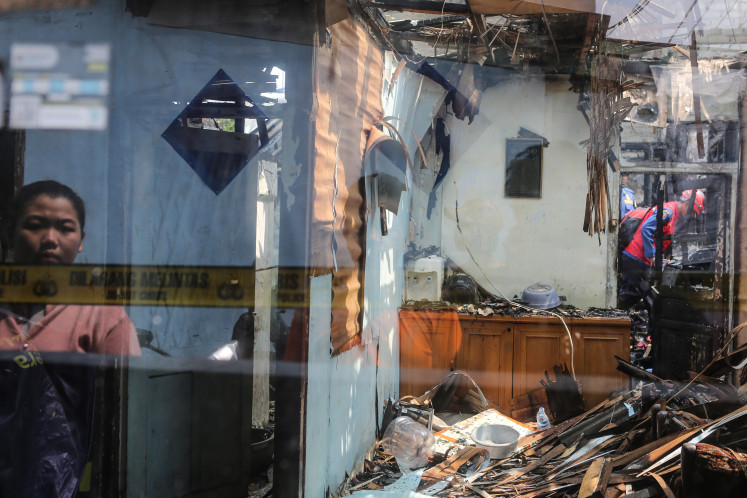Popular Reads
Top Results
Can't find what you're looking for?
View all search resultsPopular Reads
Top Results
Can't find what you're looking for?
View all search resultsEditorial: A global, green commitment
Indonesia’s failure during the recent Asia-Pacific Economic Cooperation (APEC) meeting to include crude palm oil (CPO) in the list of 54 environmental goods and services, which are subject to a 5 percent customs duty cut by 2015, does not necessarily constitute a diplomatic flop
Change text size
Gift Premium Articles
to Anyone
I
ndonesia’s failure during the recent Asia-Pacific Economic Cooperation (APEC) meeting to include crude palm oil (CPO) in the list of 54 environmental goods and services, which are subject to a 5 percent customs duty cut by 2015, does not necessarily constitute a diplomatic flop.
Looking on the bright side of the disappointing consensus, Indonesia as the world’s largest CPO producer stands a chance of proving to the global community it can manage the agro-industry in a more sustainable way following the massive deforestation needed to expand plantations. However unfair it may be, Indonesia, as part of the group, has to respect the deal while stepping up measures in promoting and upholding sustainable oil palm products through the credible standards and engagement of stakeholders.
CPO was missed out of the list of green products initiated by the US after the country’s Environmental Protection Agency (EPA) found that palm oil-based biodiesel only cut greenhouse gas emissions by 17 percent, just 3 percent shy of the threshold. Greenhouse gas analysis is indeed debatable as the Indonesian Sustainable Palm Oil Commission discovered the emissions were cut by between 40 and 60 percent using a method sanctioned by the European Union.
The EPA had said earlier that the CPO industry in Indonesia and Malaysia might generate nearly 2 million tons of carbon dioxide over 30 years from clearing peat swamps and forests to expand plantations in order to produce 1.5 million kiloliters of biofuel for the US by 2022.
The palm industry is an issue that has split this nation following steep demand in the past decade either for food or biofuel. On the one hand the agro-industry has emerged as a major force in the Indonesian economy, helping the country join the ranks of a few economies that consistently book growth. Investment value in the oil palm business reached US$5 billion on eight million hectares of plantations, creating thousands of jobs and welfare.
With production targeted to hit 28.4 million tons by 2014 according to the Agriculture Ministry, the industry will have to expand plantation areas by nearly 19 percent, which means more forest areas will be cleared.
Green groups say the conversion of rainforests is responsible for the severe and irreversible damage to the natural environment, not to mention the loss of endangered species. The Nature Conservancy, WWF, the Association of Primate Experts and dozens of other environmental organizations have found in a joint study that around 750 orangutans died during 2008-2009, mostly because of conflict with human beings, which occurred after their habitat was cleared for plantations.
The groups maintain that the oil palm industry does more harm than good as the environmental damage it produces exceeds the benefits of producing biofuels.
But it is both impossible and impractical to terminate the robust oil palm business, given the many industries relying on the product as raw material, such as chocolate, margarine, soap and cosmetics makers, apart from the biofuel industry.
Certification aimed at promoting green practices in oil palm production is a big leap to win public trust in the industry, which is held responsible for large-scale deforestation in Indonesia. A number of multinational companies are now using only certified palm oil in a show of support for the move.
But this is far from enough. The Indonesian government and the oil palm industry have to define measures to prove their commitment to reducing emissions from deforestation and forest degradation, which the country initiated, to fight the adverse impact of climate change.
Only when they prove this global commitment will Indonesia’s bid to include CPO in the list of green products pay off when it hosts the APEC summit next year.










